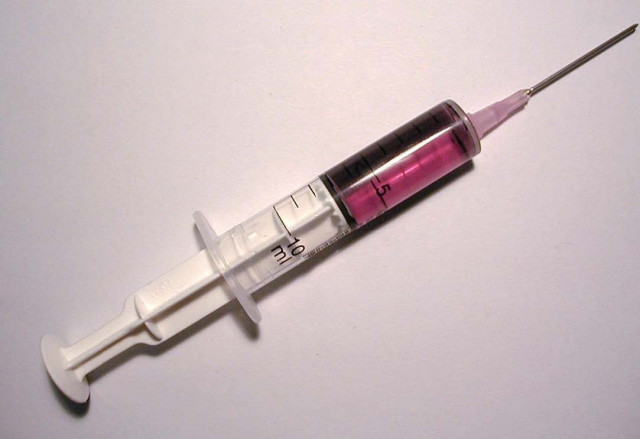Pneumonia vaccination: In Sindh, 5m infants to be immunised
The vaccination drive starts in the third week of November.

Children below the age of one year will be administered three anti-pneumonia doses within a period of three and a half months. Unlike polio immunisation, the children will have to be brought to the “fixed points” for vaccination to be set up at union council levels.
The $680 million project is funded by Global Alliance for Vaccines and Immunisation (GAVI) Alliance with a share of only $17 million from the Pakistani government. The pneumococcal conjugate vaccine (PCV) protects children against deadly pneumonia and meningitis.
The details of the pneumonia vaccination campaign were shared by the Expanded Programme for Immunisation’s (EPI) Dr Qadir Bux Abbasi at a workshop organised on Wednesday.
In Sindh, 75 master trainers have been trained about the vaccination process and will train the vaccinators, lady health visitors and the health technicians at the district levels, said the programme’s provincial head, Dr Zahoor Baloch. The EPI has so far installed seven cold storage facilities for storing pneumonia vaccines at appropriate temperatures.
Studies
Health experts at the workshop, jointly organised by the EPI and the Aga Khan University Hospital (AKUH), shared two separate studies conducted in Karachi, Hyderabad and Matiari districts.
From January to September, over 15% of the 4,259 children aged below five years suffering from pneumonia died, said Prof Dr Salma Shaikh of the Liaquat University of Medical and Health Sciences in Jamshoro. The deaths were due to late referrals, while around 40% children were handicapped despite treatment.
Pneumonia in childhood often leads to chronic obstructive pulmonary diseases later in life. Around 100,000 deaths from the illness are reported annually across Pakistan. Around 6,000 of the 40,000 children who contract meningitis die every year. Meningitis, an inflammation of the lining around the brain and spinal cord, can occur because of bacterial or viral infections.
Inappropriate feeding, overcrowding, indoor pollution and malnutrition were identified by Dr Shaikh as the major factors.
Dr Anita Zaidi, the head of AKU’s paediatrics and child health department, shared the findings of another study conducted in the public and private hospitals in Karachi, Hyderabad and Matiari.
The study focused on the 51 children diagnosed with pneumococcal meningitis at the hospitals. Of them, 28% died while 70% of the survivors suffered some damage to the brain and the nervous system, resulting in delayed development, paralysis, epilepsy and loss in hearing and vision.
Pakistan has become the first country in South Asia to provide free PCVs, claimed Dr Zaidi. The vaccines will prevent thousands of children from dying or being permanently maimed each year from preventable sickness. “Immunisation coverage in poorest groups is essential to realise the full benefit of preventing pneumonia. It’s tragic that rich [people] mostly get the advantages instead of the poor,” she lamented.
The district health officer, Dr Baksh Ali Pitafi, whose staff is responsible to implement the programme in Hyderabad, complained that the EPI is “bringing programme after programme” disregarding the staff’s operational strength. He claimed that the EPI does not pay the staff for their services timely and the department is also facing logistical problems.
Similar workshops have been organised in Thatta and Naushero Feroz recently and another one is to be held in Sukkur on November 1 (today).
Published in The Express Tribune, November 1st, 2012.



















COMMENTS
Comments are moderated and generally will be posted if they are on-topic and not abusive.
For more information, please see our Comments FAQ